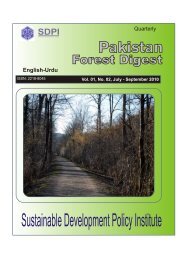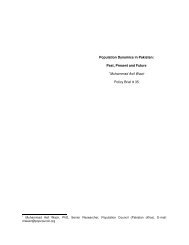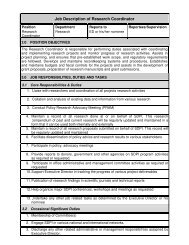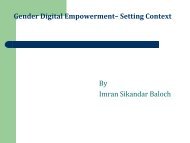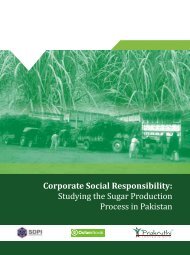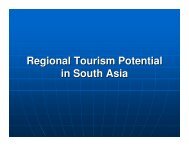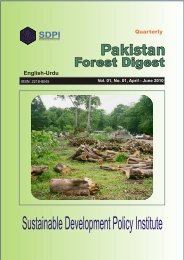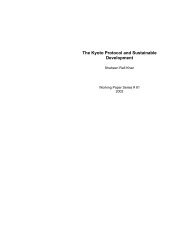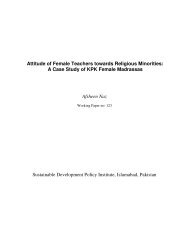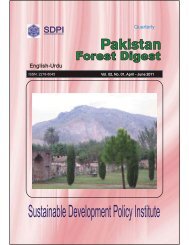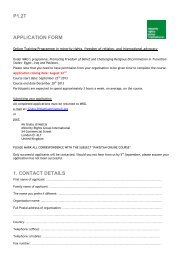Annual Report 2009-10 - Sustainable Development Policy Institute
Annual Report 2009-10 - Sustainable Development Policy Institute
Annual Report 2009-10 - Sustainable Development Policy Institute
- No tags were found...
You also want an ePaper? Increase the reach of your titles
YUMPU automatically turns print PDFs into web optimized ePapers that Google loves.
<strong>Annual</strong> <strong>Report</strong><strong>2009</strong> - 20<strong>10</strong>Regional IntegrationImagine a New South Asia (INSA)Imagine a New South Asia (INSA) has evolved over the years as a regional network to advancea shared sense of the South Asian vision to promote increased policy convergence on key issues,more regional cooperation, the joint initiative of the government as well as at the civil societylevel. It seeks to promote the vision of a peaceful, prosperous, just and democratic SouthAsia. The INSA is run by a Regional Steering Committee, comprising representations fromcountry chapters, core constituency groups, and representations from international organisationswith a regional concentration. The day-to-day activities are run by a rotating Secretariat.The current Secretariat is the <strong>Sustainable</strong> <strong>Development</strong> <strong>Policy</strong> <strong>Institute</strong> (SDPI), which took overfrom Bangladesh Unnayan Parishad (BUP). SDPI is responsible for highlighting the integratedsolution for a New south Asia and responsible for the dissemination of policy recommendationsto relevant stake holders which includes various think tanks at the regional level and governmentofficials as part of the SAARC process.The core constituencies of the alliance are think-tanks, media and politicians who are engagedin evidence-based policy advocacy by generating new ideas and targeted learning for establishinga people's South Asia. The network also plans to be active and supplement and would workwith existing South-Asia wide networks, alliances, and initiatives and campaigns. Before the initiativewas transformed into an independent regional network, it was initiated by a group of activeacademics, think tanks, media persons, politicians across the region with initial support fromActionAid international. The members of the network have decided to transform the initiative intoa regional network. During these years, the members of INSA have conducted research intofour thematic clusters: (a) economic management, (b) human rights, democracy and governance,(c) peace and justice, and (d) natural resource management. The books of the series,published by Pearson, were launched in February-March 20<strong>10</strong> across the region.The INSA holds its flagship forum, beginning from 2007, every year as a run up to the SAARCsummit, the South Asia <strong>Policy</strong> Forum, in collaboration with major academic institutions and universitiesby bringing in top politicians, academics, senior journalists, and leading CSO representatives.At the country level, coordinated by anchor organisations, with guidance and supportfrom national steering committees, the INSA has organized numerous events, including researchconferences on topical issues, countrywide marches, revisits of Indian partitions in Pakistanand India, and activities targeted for youth. On the eve of the 16th Summit of the SouthAsian Association for Regional Cooperation (SAARC), the Third South Asia <strong>Policy</strong> Forum washeld from 25-27 April 20<strong>10</strong> in Kathmandu, Nepal, with participants from Bangladesh, Bhutan,India, Nepal, Pakistan and Sri Lanka representing a cross-section of policy and research organizations,academicians, parliamentarians, policymakers, journalists and civil society organizations.The Forum was organized by Imagine a New South Asia (INSA), Climate Action NetworkSouth Asia (CANSA), South Asia Watch on Trade, Economics & Environment (SAWTEE), andSouth Asian Centre for Economic Journalists (SACEJ). Formal deliberations took place in ninetechnical sessions followed by a roundtable discussion with South Asian politicians and leadersin the panel. The session themes were: Climate Actions: Shared Vision of South Asia; Water,Sanitation and Hygiene; Trans-boundary Sharing of Water; Climate Resilient Society in SouthAsia; Low Carbon Society in South Asia; Agriculture and Food Security; Trade, Biodiversity and<strong>Development</strong> Issues for the SAARC Region; Democratizing South Asia: Role of Media Activism;and Conflict and Peace in South Asia. The finale was a roundtable on South Asia's <strong>Development</strong>alChallenges and Political Commitment to come up with a set of recommendations for theSAARC Summit as well as the overall SAARC process.For further details contact Ms. Afshan Ahmed. Afshan@sdpi.org38S u s t a I n a b l e D e v e l o p m e n t P o l I c y I n s t I t u t e



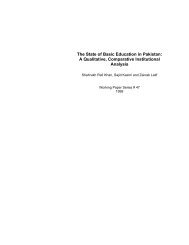
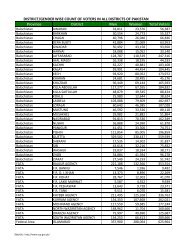
![(October - December, 2010) [13th SDC Special Bulletin]](https://img.yumpu.com/50118608/1/184x260/october-december-2010-13th-sdc-special-bulletin.jpg?quality=85)
